Ansul - Fire Suppression System Design
Our experienced engineers specify exactly which Ansul fire extinguishers should be used where to ensure the most effective results when extinguishing a fire.
We design sophisticated alarm systems that include heat, smoke, and fire detectors, that are created for specific locations and the fire risks they commonly present.
Our Ansul solutions ensure that our customers are thoroughly prepared for the possible eventuality of a fire. Whatever the environment, we’ve got you covered.
A global brand of Tyco Fire Protection Products, Ansul systems are designed to extinguish fires. There are different Ansul products ranging from individual portable fire extinguishers to pre-engineered industrial, restaurant, and vehicle systems, and sophisticated fire suppression and detection systems.
Ansul fire protection products also include foam, dry chemical, and gaseous clean agents used for fighting fires, as well as agents manufactured specifically for chemical spill control and for mitigating vapor.
All Ansul fire protection products are designed and manufactured in accordance with strict standards and are tested and scrutinized by national and international approval agencies and independent testing laboratories.
Aware of the different needs of different industries, because of specific hazards that vary, Tyco offers solutions for different industries including:
So, for instance, in the aviation industry which has high risks due to the highly flammable fuels that are used to fly aircraft, specific Ansul solutions for the industry include detection and control systems, gaseous fire suppression systems, industrial systems that use dry chemicals and twin agents, suitable portable fire extinguishers, and foam concentrates and hardware.
Although not as potentially hazardous as the aviation industry, the healthcare industry requires broader solutions, largely due to multifunctional facilities from kitchens and laboratories to data centers, generator rooms, document and archive storage areas, and even heliports and helidecks. Ansul solutions for the healthcare industry include the same detection and control systems designed for the aviation industry, and gaseous fire suppression systems and portable fire extinguishers that are slightly different. Additionally, certain spill-control products and restaurant systems are suggested.
The National Fire Protection Association (NFPA) Standard for Portable Fire Extinguishers NFPA 10-2018 defines five primary classes of fire:
Class A: Fire that results from ordinary combustible material including wood, paper, cloth, and many different types of plastic.
Class B: Fire-burn that occurs in flammable liquids and gases, combustible liquids, oils, petroleum greases, and alcohol.
Class C: Fires that involve energized electrical equipment.
Class D: Fires that occur in combustible metals including lithium, magnesium, potassium, sodium, titanium, and zirconium.
Class K: Fires in cooking appliances that involve some type of combustible cooking medium including animal and vegetable oils and fats.
Additionally, an LNG fire involves liquefied natural gas.
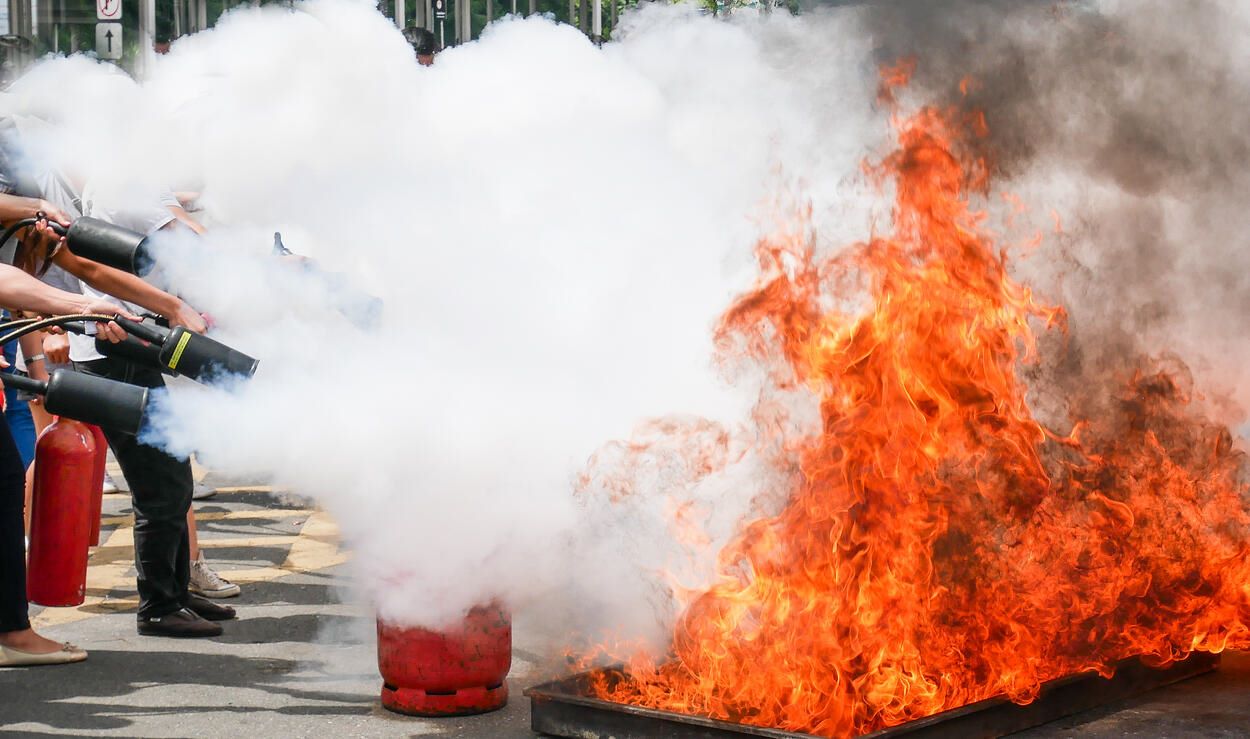
Even the best equipment needs trained and experienced operators if it is to be used effectively. For this reason, Ansul has a fire school that provides hands-on, three-day fire training that involves fighting more than 20 different types of fires including gravity-fed and pressurized gas and liquid fires and unconfined spills. When training is done on-site, at the 350-acre school in Marinette Wisconsin, they get the benefit of high-tech industrial props including a tanker truck, overhead flange, paint locker, and propane jets that are used to create the kind of firefighting challenges faced in real life.
In addition to learning how to fight fires, students are also taught invaluable fire extinguisher inspection and maintenance procedures that emphasize how important regular service of these tools is. They are also taught to recognize and report abnormal conditions that might get in the way of high speed, effective performance.
Ansul fire training is OSHA 29 CFR and NFPA 10 compliant and students are issued with a certification of completion after the course.
The Ansul Fire School also offers an NFPA-compliant one-day, hands-on Extinguisher Service & Maintenance Certification Training Program for those who inspect, service, and maintain their own Ansul fire extinguishers.
In addition to training held in Wisconsin, Ansul offers training in remote locations.
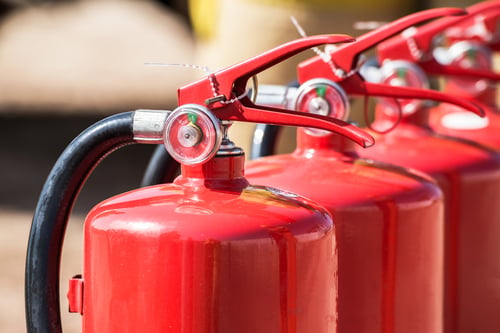
The extensive Ansul product line includes hand-portable and wheeled fire extinguishers, as well as large self-contained handline units. They form a vitally important part of any Ansul system design.
Ansul portable extinguishers come in a variety of different forms and are made in accordance with various ANSI/UL, ULC, and/or NFPA 10 and other standards. Like all fire extinguishers, the Ansul brand is manufactured to include different classes of fire extinguisher that correlate with a particular class of fire. So, for example, a Class K extinguisher would be used in a restaurant fire that involves burning oil.
Ansul fire extinguishers include:
Ansul system design might also include manual hose-line units that enable efficient fire suppression in remote locations, when multiple hazards are being faced, or when there is limited personnel available for firefighting. They are particularly useful and effective in situations where hand-portable and wheeled extinguishers are not able to provide sufficient capacity.
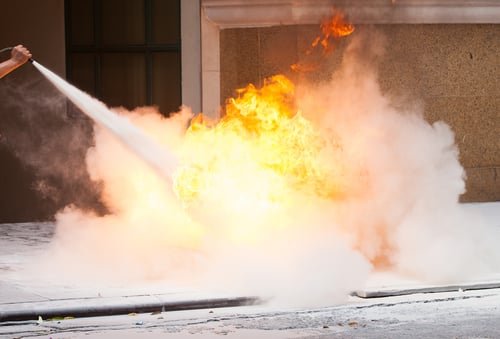
Ansul’s product line for fire extinguishing and cleanup includes dry chemical and foam concentrates, discharge devices, proportioning equipment, as well as gaseous clean agents, spill-control chemicals and treatments, and vapor mitigation and neutralizing agents.
When designing Ansul systems, it is essential to have a thorough knowledge of these products so that they can be specified together with the hardware required to discharge or dispense them. Different product types are intended for different applications and different classes of fire.
Foam concentrates include:
Discharge devices for Ansul foam concentrates include high expansion generators for use with Jet-X high expansion foam and storage tank protection equipment that is designed to protect flammable liquid storage tanks by applying foam down the inside walls of tanks. Foam monitors and sprinkler heads for protein and fluoroprotein foams are also available.
Other portable equipment includes high-expansion foam generators, handline nozzles and eductors that create a foam solution for handline nozzles, foam systems mobilcarts for hazardous areas with flammable liquids, and various trailers.
Proportioning equipment, ranging from high-quality bladder banks to simple, inexpensive line proportioners, provides an effective means of mixing foam with the required volumes of water.
More sophisticated balanced-pressure pump proportioning systems (pump skids) improve efficacy by maintaining an equal pressure in the water and foam concentrate inlets but enabling quick accurate changes when required. Typically, these systems are used to protect aircraft hangars, marine docks, chemical processing plants, and tank farms.
Spill control products include free-flowing treatment agents that treat acid, caustic, solvent, and formaldehyde spills by neutralizing, absorbing, or solidifying them.
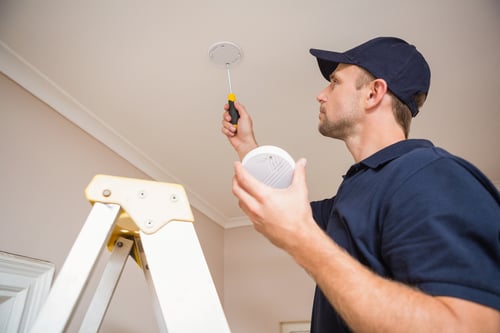
The range of Ansul system design products includes gaseous suppressions systems and detection and control systems.
Detection and control systems include conventional and analog addressable agent releasing systems that incorporate Ansul’s Autopulse detection, control, and fire suppression release panels. Conventional release systems detect smoke, heat, and flames, and perform key operations including shutting down equipment, sounding alarms, and releasing the fire suppression system. Analog addressable releasing systems are modular and systems can be configured for high rise buildings and campuses. These systems may be used with high-tech Vesda aspirating smoke detectors that have multi-level warnings and work just about anywhere.
Gaseous suppression systems include:
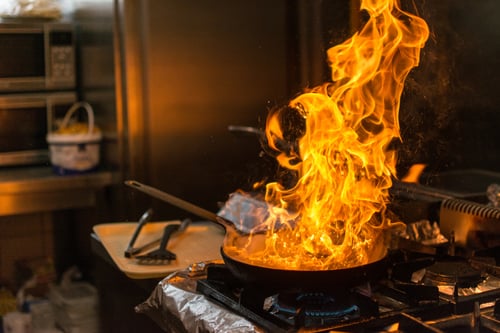
Ansul‘s pre-engineered systems are designed for various industrial applications as well as specialized use in restaurants and for vehicles. While the equipment utilized in each system is not always unique to the system, the choice of equipment included in the system is vital and what makes it appropriate and efficient.
Nearby Engineers New York Engineers has considerable experience with Ansul system design in a number of different industries. However complex your system needs to be, we are available to design it.